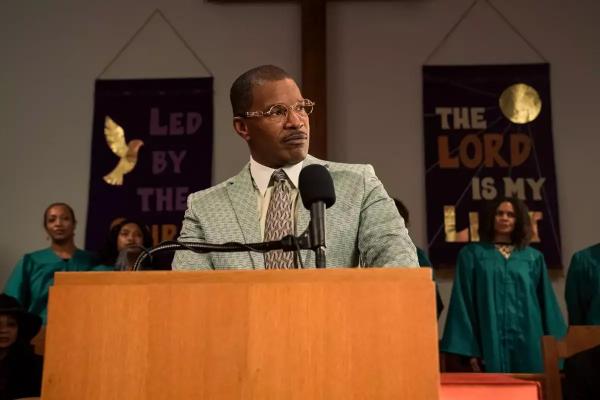The Burial opens with a shot of Willie Gary (Jamie Foxx) standing in a pulpit and proclaiming, “In Black church, they don’t say that I fit the description. In Black church, they don’t judge me because of the color of my skin. In Black church, they don’t call me out my name. And if they do call me out my name, you know what they call me? …They call me a child of God.”
What follows is a film that illustrates how the church can be a haven, particularly for marginalized cultures. But the film also warns that churches are as vulnerable to exploitation as any other human institution, including the law. The only real antidote for this inequity is memory.
The specific churches in question in The Burial are Black churches in the South, particularly those who are part of the National Baptist Convention (NBC). The NBC is the largest organization of predominantly and historically Black churches in the world.
After emancipation in 1863, with the support of the Consolidated American Baptist Convention, Black Christians across the American South left the white churches they’d been forced to attend to form their own congregations (state laws required even Black congregations in the South to have oversight from white ministers). In the wake of the CABC’s dissolution, three separate Black church organizations formed, beginning in 1880 — the Baptist Foreign Mission Convention, the American National Baptist Convention, and the National Baptist Education Convention. In 1895, these groups consolidated under the NBC banner. Today, the NBC is the second largest Baptist convention in the world, after the Southern Baptist Convention; in 2022, they reported 7.5 million members.
But in the late 1990s, the denomination was at the center of a major scandal that involved an international corporation, funeral homes, and price gouging. The Burial, based on a 1999 New Yorker article by the same name, puts a spotlight on the victims of that scandal — impoverished Black people whose grief renders them even more vulnerable. They are communities whose suffering was buried beneath contracts, legalese, and apathy — in short, buried beneath a system built to disenfranchise them.
While The Burial opens with Willie Gary at the pulpit, reflecting on the particular sense of security and belonging Black church offers Black Americans, Gary is not a preacher (his brother’s the pastor, and Willie is speaking at his invitation). Gary is a personal injury attorney, one of the most successful in the country. In 1995, Gary agrees to represent Jeremiah O’Keefe (Tommy Lee Jones), who owns a small chain of funeral homes in Southern Mississippi. O’Keefe, a white man, is suing the Loewen Group, a Canadian corporation that has been buying up independent funeral homes across the United States and has now set its sights on O’Keefe’s business.
At the recommendation of a young, Black lawyer in the firm, O’Keefe brings in Gary because the trial is taking place in one of the Blackest counties in Mississippi. “I thought Justice was blind,” O’Keefe laments at one point. We want to live in a world where we’re all equal before the law, where class, race, gender, sexuality, ability, and religion don’t affect our access to a just and equitable life. O’Keefe, it seems, has lived more than seven decades under the delusion that the U.S. in general and Mississippi in particular is such a place.
It’s not until O’Keefe’s attorneys uncover the Loewen Group’s ties to the NBC that Gary finds a way to illustrate for the jury the insidious nature of the Loewen Group’s contempt for rural white people like O’Keefe and the impoverished Black residents of Mississippi.
The Loewen Group made its massive profits, in part, because, after scooping up private funeral homes, they retained the individual branding while using their collective buying power to make massive profits. Because the Loewen Group purchased massive quantities of funeral homes, they could provide cheaper services than anyone else; they could also price gouge in areas where they had an invisible monopoly. The president of the NBC struck a deal with the Loewen Group to train its pastors as representatives for Loewen. Pastors would sell their congregants Loewen Group funeral plots, caskets, and more in exchange for a percentage of the sales.
When a Loewen executive testified that they expected to make more than a billion dollars from this arrangement, in exchange for a $200,000 donation to the convention (not individual pastors or churches), the trial was functionally over. Jurors saw the Loewen Group as predators, their exploitation of those who suffer under the boot of poverty was all the more callous because they preyed on their victims when they were mired in grief. Worse still was the fact that the Loewen group manipulated pastors into becoming agents of their own community’s exploitation.
Gary’s goal in the trial was to bring the buried deeds of the Loewen Group into the light, to tell the story they hid behind contracts and laws and cultural biases and systemic injustice. In doing so, he aims to purchase some measure of justice. Is this what Willie Gary learned in Black church? God’s command to “Remember,” which is issued more than 100 times to God’s people, is an insistence that their community be one of justice and liberation. It is by knowing the past that we chart a course for a faithful future.
“Remembering” is how we avoid becoming the very thing God liberated us from. So, in Deuteronomy’s version of the Ten Commandments, the people are to keep the Sabbath because they must, “Remember that you were a slave in the land of Egypt, and the Lord your God brought you out from there with a mighty hand...” (Deuteronomy 5:15). Solomon’s great failure as a king is that he enslaved his own people, becoming a pharaoh in practice because he forgot he is king of the formerly enslaved. In an article for Church Anew, Old Testament scholar Walter Brueggemann explains how Solomon replicated in Israel the exploitive labor practices of the Egyptian Pharoah:
Israel could, generation after generation, readily remember the abuse and excessively hard demands of the Pharonic system that aimed at the production of surplus wealth. Israel remembered how their lives in bondage did not matter; only their work mattered. And when their work was done, their lives were deemed dispensable. It is remarkable that royal Israel, in its ordering under the Jerusalem elite, could replicate the exploitative practices of Pharaoh. After all, Solomon, the icon of the system, was Pharaoh’s son-in-law and seems to have learned from him.
How do we forget so easily? Toward the end of the film, as Gary runs down the stories of those who were exploited by the NBC deal, he stands in a field, next to a man who is the victim of a bizarre scam that centers on funerals. The man tells Gary they’re standing in a cemetery of formerly enslaved people — those too poor to afford even a headstone. “Like all these Confederate monuments and statues you see everywhere,” the man muses, “All the lot of ’em is put up right on top of a slave burial field. It’s like taking one history and putting it right on top of another… Till one day it gets pushed down so deep… can’t no one ever find it no more.”
The Burial makes a convoluted, maddening story of injustice a little easier to grasp. The film deftly illustrates how wide the gulf is between the world of the haves and the have-nots. Between those like Loewen for whom the system is built and those like Black Mississippians it is built to exploit. Between the belonging within the walls of the Black church, and the dehumanization outside of the walls.
But as the film uncovers one injustice, it buries another. A number of the real-life Willie Gary’s former clients accuse him of both sexual assault and defrauding them of court winnings — charges absent from both the original article and the new film. Jamie Foxx also faces sexual assault charges, filed last month under New York state’s Adult Survivors Act. As we continue to learn more about the accusations against Gary and Foxx, the filmmakers’ response matters — especially if the film is courting awards. Will they heed their own message and work to tell the stories of these victims, too? Or will they try to bury them in the past?
The Burial ends with Willie Gary in prayer, reflecting on the battle he’s just won. Beneath the scene plays Le’Andria Johnson’s gospel song “Better Days,” insisting “Better days are coming.” This is indeed true, so long as we continue to remember well, telling stories like those of the victims defrauded by the Loewen Group, but also the victims of men like Willie Gary.
Got something to say about what you're reading? We value your feedback!







